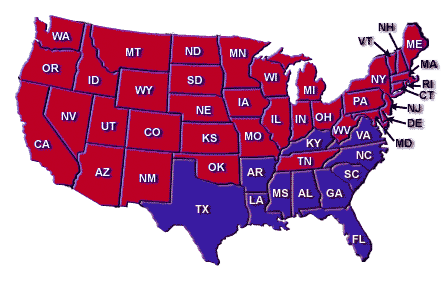Prospects for the Republican Party in 1920 appeared favorable. The previous off-year congressional elections manifested a Republican trend and party leaders hoped to build on that success. Front-runners at the beginning of the 1920 nominating convention in Chicago included General Leonard Wood, a Rough Rider friend of Theodore Roosevelt, and Governor Frank O. Lowden of Illinois. Neither could muster a majority, and eventually party professionals meeting in a "smoke-filled room" in a local hotel engineered the nomination of Warren G. Harding of Ohio on the 10th ballot. Harding had originally made his mark as a newspaper editor and parlayed his success there into a seat in the Senate. A handsome and personable man, the nominee was not an especially adept politician, but had earned important support from Henry Cabot Lodge by classifying himself as a "mild reservationist" in regard to the pending Treaty of Versailles. Massachusetts Governor Calvin Coolidge, who had gained national attention by firmly putting down a police strike in Boston, was the vice-presidential selection.
On the Democratic side, President Wilson wanted a third term despite his poor health and declining public appeal. Party regulars, however, refused to accede to the president's wishes and succeeded in garnering the 1920 nomination for a political nonentity, Ohio governor James Cox. An element of luster was added to the ticket through the nomination for vice president of an appealing young up-and-comer, Assistant Secretary of the Navy Franklin D. Roosevelt of New York.
Even though he was denied his party's nomination, Wilson helped to determine the course of the campaign. He pledged to make the election a "solemn referendum" on the Treaty and League of Nations in the hope that popular support for his postwar plans would bring the Democrats back to power. The Republican platform straddled the issue by rejecting the League Covenant, but expressing support for international cooperation as a means to keep the peace. The Democrats endorsed the League, but indicated a willingness to accept reservations.
The Socialist Party presented the strange spectacle of running Eugene V. Debs, who was then serving a 10-year prison term for antiwar activities in violation of the Espionage Act of 1917.
Harding proved to be a better judge of the electorate than Wilson. Staging a sedate campaign from his front porch in Marion, Ohio, Harding stated, "America's present need is not heroics but healing; not nostrums but normalcy; not revolution but restoration...." In November 1920, the voters overwhelmingly indicated their exhaustion with Wilson's idealism and a preference for Harding's return to normality.
The election in 1920 was noteworthy in two other respects. For the first time in American history, election results were made available to the public by radio. KDKA in Pittsburgh received polling information by Telegraph and passed the information along to listeners in the eastern part of the country. This election also marked the first time that women voted in a federal election, following the ratification of the Nineteenth Amendment in August of that year.
| Election of 1920 Candidates |
Party
|
Electoral
Vote |
Popular
Vote |
| Warren G. Harding (Ohio) J.Calvin Coolidge (Mass.) |
Republican
|
404
|
16,152,200
|
| James M. Cox (Ohio) Franklin D. Roosevelt (N.Y.) |
Democratic
|
127
|
9,147,353
|
| Eugene V. Debs (Indiana) Seymour Stedman (Illinois) |
Socialist
|
0
|
919,799
|
| P.P Christensen (Utah) Max S. Hayes (Ohio) |
Farmer
Labor |
0
|
265,411
|
| Aaron S. Watkins (Ohio) D. Leigh Colvin (New York) |
Prohibition
|
0
|
189,408
|
| W.W. Cox (Missouri) August Gillhaus (New York) |
Socialist
Labor |
0
|
31,175
|

|
AL
|
12
|
IL
|
29
|
MN
|
12
|
NC
|
12
|
TX
|
20
|
||||
|
AZ
|
3
|
IN
|
15
|
MS
|
10
|
ND
|
5
|
UT
|
4
|
||||
|
AR
|
9
|
IA
|
13
|
MO
|
18
|
OH
|
24
|
VT
|
4
|
||||
|
CA
|
13
|
KS
|
10
|
MT
|
4
|
OK
|
10
|
VA
|
12
|
||||
|
CO
|
6
|
KY
|
13
|
NE
|
8
|
OR
|
5
|
WA
|
7
|
||||
|
CT
|
7
|
LA
|
10
|
NV
|
3
|
PA
|
38
|
WV
|
8
|
||||
|
DE
|
3
|
ME
|
6
|
NH
|
4
|
RI
|
5
|
WI
|
13
|
||||
|
FL
|
6
|
MD
|
8
|
NJ
|
14
|
SC
|
9
|
WY
|
3
|
||||
|
GA
|
14
|
MA
|
18
|
NM
|
3
|
SD
|
5
|
|
|
||||
|
ID
|
4
|
MI
|
15
|
NY
|
45
|
TN
|
12
|
|
|
|
892 ?
|